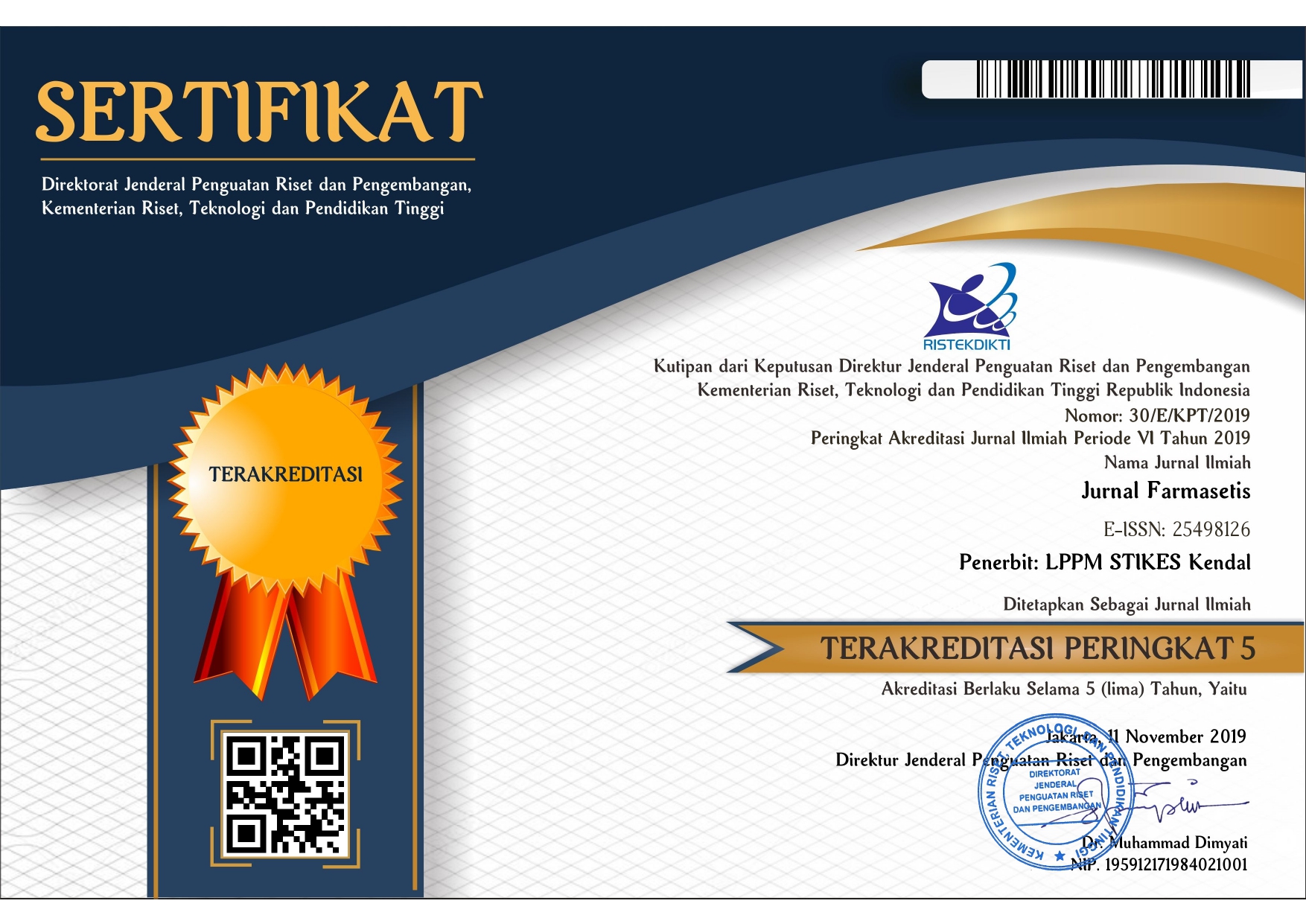Hubungan Kepatuhan dan Keberhasilan Terapi Diabetes Melitus
DOI:
https://doi.org/10.32583/far.v12i3.1290Keywords:
diabetes melitus, kepatuhan, keberhasilan terapi, mmas-8Abstract
Diabetes melitus merupakan penyakit non infeksius yang menjadi masalah global di dunia. Manajemen terapi yang tepat dibutuhkan untuk mencegah terjadinya komplikasi dan mengurangi angka kematian. Salah satu faktor yang mempengaruhi keberhasilan terapi adalah kepatuhan dalam pengobatan. Kepatuhan minum obat yang rendah dapat menyebabkan komplikasi, meningkatkan biaya pengobatan, bahkan kematian. Tujuan penelitian ini adalah untuk melihat hubungan antara kepatuhan dengan keberhasilan terapi di 3 Puskesmas Karawang. Penelitian ini merupakan penelitian deskriptif analitik dengan rancangan cross-sectional. Penelitian dilakukan dengan menggunakan kuesioner MMAS-8 untuk melihat tingkat kepatuhan minum obat diabetes melitus. Nilai r hitung kuesioner adalah 0,355 dan koefisien reliabilitas adalah 0,998. Untuk melihat hubungan antara tingkat kepatuhan minum obat dengan keberhasilan terapi di 3 Puskesmas Karawang dilakukan menggunakan uji chi-square dengan taraf kepercayaan 95%. Hasil penelitian menunjukkan p-value¬ 0, 038. Sehingga dapat disimpulkan pada penelitian ini terdapat hubungan antara tingkat kepatuhan dengan keberhasilan terapi di 3 Puskesmas Karawang.
References
Ali, R. A. E., Hamed, E. N. E. N., Al-Torky, M. A., & Atia, F. M. (2021). Medication Adherence and Predictors of Non-Adherence among Patients with Type 2 Diabetes Mellitus in Sohag, Egypt. The Egyptian Journal of Community Medicine, 39(4), 51–56. https://doi.org/10.21608/ejcm.2021.202264
Alqarni, M. A., Alrahbeni, T., Al Qarni, A., & Al Qarni, M. H. (2019). Adherence to Diabetes Medication Among Diabetic Patients inThe Visha Governorate of Saudi Arabia-a cross-sectional survey. Patient Preference and Adherence, 13, 63–71.
C, N. H., Gali, A., & Muraraiah, S. (2020). Assessment of Factors Influencing Adherence to Antidiabetic Drugs among Patients with Type 2 Diabetes Mellitus at a Tertiary Care Hospital in India. Pharmacology and Clinical Pharmacy Research, 5(1), 7–13. https://doi.org/10.15416/PCPR.V5I1.26507
Campesi, I., Franconi, F., Seghieri, G., & Meloni, M. (2017). Sex-gender-related therapeutic approaches for cardiovascular complications associated with diabetes. Pharmacological Research, 119, 195–207. https://doi.org/10.1016/J.PHRS.2017.01.023
Ciarambino, T., Crispino, P., Leto, G., Mastrolorenzo, E., Para, O., & Giordano, M. (2022). Influence of Gender in Diabetes Mellitus and Its Complication. International Journal of Molecular Sciences, 23(16), 1–13. https://doi.org/10.3390/ijms23168850
Ibrahim, A. O., Agboola, S. M., Elegbede, O. T., Ismail, W. O., Agbesanwa, T. A., & Omolayo, T. A. (2021). Glycemic control and its association with sociodemographics, comorbid conditions, and medication adherence among patients with type 2 diabetes in southwestern Nigeria. The Journal of International Medical Research, 49(10). https://doi.org/10.1177/03000605211044040
IDF. (2017). Diabetes Atlas (8th ed.). International Diabetes Federation.
Kapur, A., & Seshiah, V. (2017). Women & diabetes: Our right to a healthy future. The Indian Journal of Medical Research, 146(5), 553. https://doi.org/10.4103/IJMR.IJMR_1695_17
Kassahun, T., Eshetie, T., & Gesesew, H. (2016). Factors associated with glycemic control among adult patients with type 2 diabetes mellitus: a cross-sectional survey in Ethiopia. BMC Research Notes, 9(1). https://doi.org/10.1186/S13104-016-1896-7
Lin, L. K., Sun, Y., Heng, B. H., Kwang Chew, D. E., & Chong, P. N. (2017). Medication adherence and glycemic control among newly diagnosed diabetes patients. BMJ Open Diabetes Research & Care, 5(1). https://doi.org/10.1136/BMJDRC-2017-000429
Osei-Yeboah, J., Lokpo, S. Y., Owiredu, W. K. B. A., Johnson, B. B., Orish, V. N., Botchway, F., Ussher, F. A., & Avorkliyah, R. (2019). Medication Adherence and its Association with Glycaemic Control, Blood Pressure Control, Glycosuria and Proteinuria Among People Living With Diabetes (PLWD) in the Ho Municipality, Ghana. The Open Public Health Journal, 11(1), 552–561. https://doi.org/10.2174/1874944501811010552
Rana, M. M., Islam, M. S., Akter, J., & Khatun, S. (2019). Medication adherence to Type 2 diabetic patients hospitalized at a tertiary care hospital. Journal of Health Sciences, 9(3), 159–167. https://doi.org/10.17532/JHSCI.2019.818
RI, K. K. (2018). Laporan Hasil Riset Kesehatan Dasar (Riskesdas) | Badan Penelitian dan Pengembangan Kesehatan. Kemenkes RI. https://www.litbang.kemkes.go.id/laporan-riset-kesehatan-dasar-riskesdas/
Sacerdote, C., Ricceri, F., Rolandsson, O., Baldi, I., Chirlaque, M. D., Feskens, E., Bendinelli, B., Ardanaz, E., Arriola, L., Balkau, B., Bergmann, M., Beulens, J. W., Boeing, H., Clavel-Chapelon, F., Crowe, F., de Lauzon-Guillain, B., Forouhi, N., Franks, P. W., Gallo, V., … Wareham, N. (2012). Lower educational level is a predictor of incident type 2 diabetes in European countries: The EPIC-interact study. International Journal of Epidemiology, 41(4), 1162–1173. https://doi.org/10.1093/ije/dys091
Sanchez-Rangel, E., & Inzucchi, S. E. (2017). Metformin: clinical use in type 2 diabetes. Diabetologia, 60(9), 1586–1593. https://doi.org/10.1007/s00125-017-4336-x
Sendekie, A. K., Netere, A. K., Kasahun, A. E., & Belachew, E. A. (2022). Medication adherence and its impact on glycemic control in type 2 diabetes mellitus patients with comorbidity: A multicenter cross-sectional study in Northwest Ethiopia. PLoS ONE, 17(9 September), 1–18. https://doi.org/10.1371/journal.pone.0274971
Society, E. (2022). Diabetes and Older Adults | Endocrine Society. https://www.endocrine.org/patient-engagement/endocrine-library/diabetes-and-older-adults
Williams, R., Colagiuri, S., & Almutairi, R. (2019). IDF Diabetes Atlas (9th ed.). International Diabetes Federation.
Downloads
Published
How to Cite
Issue
Section
License
Copyright (c) 2023 Maya Arfania, Mia Nur'aeni, Fransiska Br Manihuruk, Silvia Mutia Nuri

This work is licensed under a Creative Commons Attribution-NonCommercial-NoDerivatives 4.0 International License.







